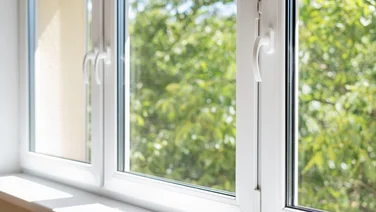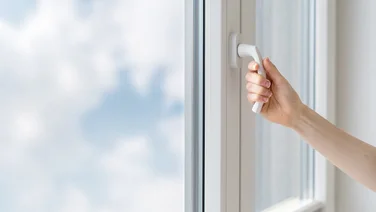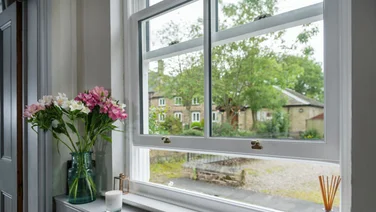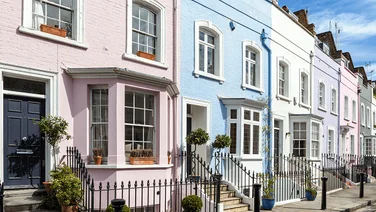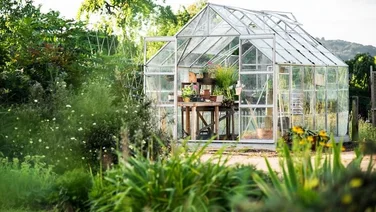- You can recycle your old windows in return for discounts on new ones
- Double glazing improves your home’s insulation, keeping you warmer
- It also helps reduce outside noise and increases your property’s value
The Anglian windows scrappage scheme can help you save around £1,000 on the cost of new windows and doors. This could mean saving money on your energy bills – around £140 a year.
If you’re not eligible for the Anglian windows scrappage scheme, then it’s worth looking into available double glazing grants.
his guide will cover everything you need to know about the Anglian windows scrappage scheme, including what it is and how it works. Also, if you’d like to know what new windows might cost you, you can fill in our online form. We’ll connect you with our trusted suppliers, who’ll get in touch with obligation-free quotes for you to compare.
If you want to know how much new windows might set you back, look at our double glazing cost calculator.
What is the Anglian Scrappage Scheme?
The Anglian Scrappage Scheme was set up to help people recycle their old windows and doors rather than just get rid of them. It’s meant to help people not only save money on new windows and doors, but also reduce the environmental impact of discarding old ones.
When you use the Anglian Scrappage Scheme, you can save around £1,000 on new windows and doors. This is helpful considering the generally high costs of installing double glazing throughout your home.
Recycling your windows and doors via the Anglian Scrappage Scheme involves havingAnglian Windows send a team of professionals to your home. They’ll remove your old windows and doors, ready to be correctly recycled and given a new lease of life.
The uPVC will be removed and sorted at Anglian’s recycling centre in Norwich. After being cut into shorter lengths, it’s fed through a machine and converted back into uPVC pellets. These pellets can then be melted and moulded back into new uPVC frames for new windows and doors.
This process is called co-extrusion, where the recycled uPVC becomes the core of new windows and doors. New uPVC is still required to create a new frame, but overall, this process is better for the environment because less ‘virgin’ uPVC needs to be used.
It’s a similar process for the metal and glass removed from the recycled windows and doors. Glass, for example, can be ground up and used in road surfaces. On the other hand, metal (aluminium) can be recycled for use repeatedly.

How do I qualify for the Anglian Scrappage Scheme?
Qualifying for the scheme is relatively simple:
- Any UK homeowner qualifies for the Anglian Scrappage Scheme.
- But, you must intend to use Anglian Windows to replace old windows and doors.
- Not eligible if using another supplier.
The government doesn’t back the Anglian Scrappage Scheme, so it’s not tied to existing government grants. However, improving home efficiency will contribute to the UK government’s ambitions of reaching net-zero emissions by 2050.
Be aware, that aside from the ECO4, which requires you to be on Universal Credit or Pension Credit, there are currently no government grants for new windows and doors, so the Anglian Scrappage Scheme is your best bet for reducing the costs of installing double glazing.
How much could I save with Anglian’s Scrappage Scheme?
You could save around £1,000 on the cost of new windows and doors by recycling your old ones via the Anglian Scrappage Scheme.
You’ll also save roughly £1,800 on your energy bills after 10 years with new double glazing, according to Anglian.
Upgrading older double glazed windows offers various benefits, including but not limited to:
- Environmental benefits – You’ll not only save money but also reduce the amount of waste going to landfills. Old, single-pane windows can get a new lease of life when properly recycled.
- Energy Efficiency & Cost Savings – Replacing double glazing reduces heating bills by up to £140 per year and lowers carbon emissions. On average, homes in the UK lose roughly 25% to 30% of their heat through their windows and doors. Double glazing helps mitigate this.
- Improved Comfort & Home Health – New windows eliminate draughts, reduce noise, prevent mould, and cut condensation buildup.
- Increased Property Value & Security – Modern double glazing improves EPC ratings and home resale value and enhances security with multi-point locking systems.
- Durability & Aesthetic Options – New double glazing lasts 25+ years and comes in uPVC, timber, and heritage styles like sash and bay windows.
- Financial Assistance & Savings – Scrappage schemes, recycling incentives, and financing options help offset upfront costs.
How much gets recycled through Anglian’s scrappage scheme?
Recycling your windows and doors via the Anglian Scrappage Scheme is one way to lessen your environmental impact. Anglian claims that each year, it recycles roughly:
- 108,000 windows and doors
- 1,900 tonnes of uPVC windows
- 2,268 tonnes of glass
- 282 tonnes of metal
That means fewer windows and doors with plastic frames either being burned or sent to clog up landfills.
Summary
- You can recycle old windows and doors via the Anglian Scrappage Scheme.
- The scheme helps you save roughly £1,000 on purchasing new windows and doors from Anglian Windows.
- If you’re a UK homeowner and plan to replace your windows and doors through Anglian Windows, you’ll qualify for the scheme.
- Recycling old windows and doors is better for the environment, as less waste goes to landfill.
- Double glazing can save you around £1,800 on your energy bills after 10 years.


